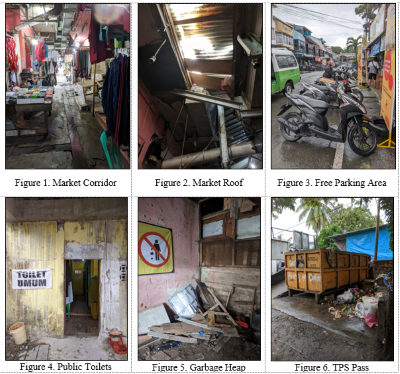Analysis of the Existing Conditions of Balikpapan Permai Market Towards Smart Living Market and SNI Through Revitalization
DOI:
https://doi.org/10.24036/cived.v10i3.500Keywords:
Public Market, Revitalization, Smart LivingAbstract
Traditional markets are often associated with unhygienic conditions and limited facilities. This makes consumers uncomfortable shopping in traditional markets and results in traditional markets losing out to modern markets. Therefore, it is important for traditional markets to be empowered in order to maintain their sustainability and existence. Balikpapan Permai Market is one of the existing markets in Balikpapan and has various problems related to the quality and physical and non-physical conditions of the market. The purpose of this research is to find out the supporting factors of Balikpapan Permai Market revitalization by using smart living approach and SNI 8152:2021 Pasar Rakyat. Smart living will review in terms of harmony, health, mobility, security, and building, while SNI 8152:2021 Pasar Rakyat will review in terms of general requirements, technical requirements, and management requirements. The method used in this writing is a qualitative method by conducting several stages of research. The results of this research are supporting factors that make Balikpapan Permai Market needs revitalization by reviewing the existing conditions and opinions from the head of UPT market, traders, and market visitors.
Downloads
References
Anggraini, G., Amalia, D., Hermawan, F., &; Ismiyati. (2017). Standardization of Traditional Market Arrangement in Indonesia (Case Study of Traditional Market in Semarang City). National Conference on Civil Engineering, 11(1), 111–120.
Mirah, A. A., &; Paramita, P. (2013). Effectiveness and Impact of Traditional Market Revitalization Program in Agung Peninjoan Market. E-Journal EP Unud, 2(5), 233–243.
Olajuyin, O. A., Olajuyin, A. B., Olajuyin, A. A., & Obimakinde, O. S. (2021). Covid-19 Burden in the Traditional Market : The Risk Factors. American Journal of Preventive Medicine and Public Health, 7(7), 203–206.
Banurea, R., Pramita, D., & Balqis, D. (2023). Traditional Market Development Strategy in Langsa City. Asian Journal of Management Analytics, 2(1), 29–44. https://doi.org/10.55927/ajma.v2i1.2446
Fadjarwati, N., Midiyanti, R., Sastrawan, J., &; Wulandari, D. (2021). Analysis of Bandung Regency People's Market Asset Performance Based on SNI (Ciwidey People's Market Case Study). Journal of Infrastructure & Facilities Asset Management, 5(1), 61–70. https://doi.org/10.12962/j26151847.v5i1.8734
Arimbawa, I. G. N. A. A., & Marhaeni, A. A. I. N. (2017). Analysis of the effectiveness of the traditional market revitalization program in the Intaran Sanur Traditional Village Market. PYRAMID Journal of Population and Human Resource Development, 8(1), 18–26.
Minister of Trade of the Republic of Indonesia. Regulation of the Minister of Trade Number 70 of 2013 concerning Guidelines for Structuring and Fostering Traditional Markets, Shopping Malls, and Modern Stores. , Ministry of Trade of the Republic of Indonesia § (2013). Indonesian.
Aryadi. (2023). Welcoming IKN, Balikpapan City Government Will Build a Main Market. Taken from Lintasbalikpapan website: http://www.lintasbalikpapan.com/berita/detail/sambut-ikn-pemkot-balikpapan-akan-bangun-pasar-induk#:~:text=Kepala Trade Office %28Disdag%29 Balikpapan City Haemusri Umar, staple material. %22We will revitalize traditional markets.

Downloads
Published
How to Cite
Issue
Section
License
Copyright (c) 2023 Oryza Lhara Sari, Rahmat Rahmat, Maryo Inri Pratama, Umar Mustofa

This work is licensed under a Creative Commons Attribution 4.0 International License.







2.jpg)
